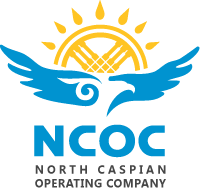
North Caspian Operating Company (NCOC) is an operating company for the North Caspian Sea Production Sharing Agreement (NCSPSA). NCOC is based in Atyrau, Kazakhstan. The agreement includes seven companies consisting of KazMunayGas, Eni, ExxonMobil, Shell, Total S.A. (16.88% each), China National Petroleum Corporation (8.4%) and Inpex (7.56%). [1]